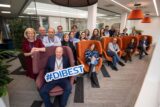The Western Development Commission (WDC) today announces the commencement of the DIBEST (Digital Innovation in the Blue Economy to Support Tourism) project. Following an initial partner meeting in the RDI Hub, Killorglin, Co. Kerry, the project is now underway. It is funded by a European Regional Development Fund grant exceeding two million euros and aims to enhance the digital capabilities of the blue economy and social tourism sector in Ireland’s Atlantic Area and beyond over the next three years.
Ian Brannigan, WDC’s Head of Regional Development, stated,
The West Coast of Ireland is one of the maritime treasures on Europe's Atlantic seaboard. Enabling our SMEs to grow the associated marine tourism sector through the identification and adoption of best-in-class digital technologies is at the core of the DIBEST project. This aligns with the Western Development Commission's strategic aim to connect our unique regional offerings—in terms of communities, coastline, and experiences—with global visitors. As such, the Western Development Commission is excited to work with national and international partners in bringing this initiative to fruition.
Tourism micro-SMEs (small/medium enterprises) have long been the backbone of the Atlantic Area’s economy and culture, offering a diverse range of services from accommodation and food to tours and entertainment. However, the digital age has shifted the business landscape, often favouring larger enterprises. For example, consider a tour operator without an online booking system, who relies solely on phone bookings. Such businesses are potentially losing out on customers to more digitally advanced providers who offer online booking capabilities. DIBEST aims to target this type of micro-SME and assist them in levelling the playing field.
Drawing from insights gained from the Tourism 4.0 project, micro-SMEs have highlighted booking systems, revenue management software, and CRM solutions as the most crucial technological tools for their operations. Looking ahead, the most relevant technologies for future implementation are related to online sales, followed by data analysis, automation, and cybersecurity. DIBEST aims to address these specific needs, enhancing the digital competitiveness, market access, and environmental sustainability of Atlantic Area tourism micro-SMEs.

Over the course of DIBEST, a digital toolkit will be created, as well as a comprehensive training programme that emphasizes shared learning, mentoring, and business matchmaking on digital transformation, innovation, and technologies. While the specifics of the toolkit are yet to be confirmed and will be shaped by initial scoping and training needs analysis, the project aims to create a holistic approach to digital empowerment. This aligns with WDC’s ongoing campaign, ‘Local Living, Global Opportunities,’ positioning the western region of Ireland as a prime location for both sustainable and digitally advanced tourism.
The project is backed by a diverse consortium from Ireland, France, Portugal, and Spain. It will engage academic institutions, public bodies, and private organisations. These partner regions share economic and tourism characteristics with Ireland’s Atlantic Area, fostering a mutually beneficial collaborative environment.
Liam Cronin, CEO of the RDI Hub, a not-for-profit Public Private Partnership comprised of Fexco, Kerry County Council, and Munster Technological University, stated, “RDI Hub is delighted to lead with the Western Development Commission the DIBEST project supporting a network of Blue Economy microenterprises, using a triple helix model of business partner-higher education institution-tourism federation across Ireland, France, Spain and Portugal. RDI Hub is excited to support tourism microenterprises in the Atlantic coastal region in adopting digital innovations enabling them to increase their competitiveness, access to markets, and environmental sustainability. DIBEST’s vision aligns with the RDI Hub’s vision to support microenterprises to scale and grow, creating new products and services, leading to technology jobs in the South West of Ireland”
DIBEST is organised into strategic work packages, with the first package specifically led by Munster Technological University. This initial work package involves a comprehensive situational analysis replicated across partner countries. The analysis is crucial for identifying the specific needs, opportunities, and challenges facing tourism micro-SMEs in the digital landscape. The insights gained will inform the customisation of subsequent training modules and digital toolkits.





